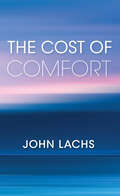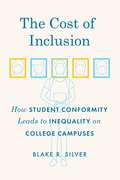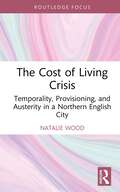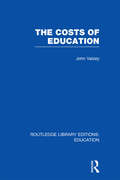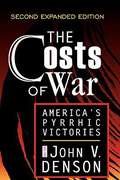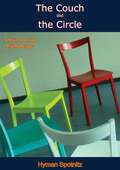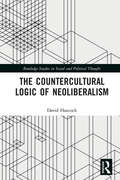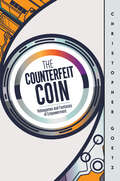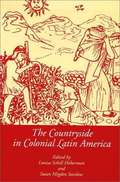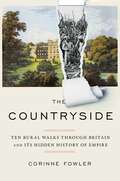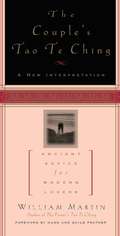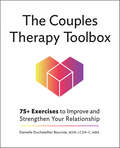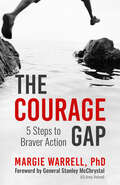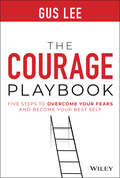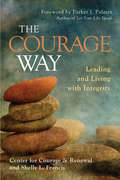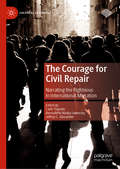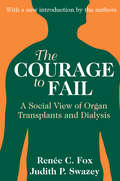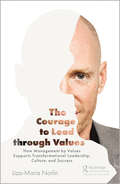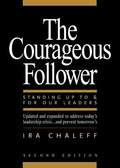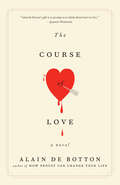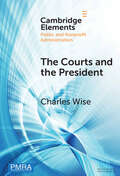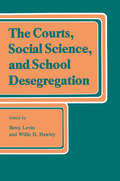- Table View
- List View
The Cost of Comfort (American Philosophy)
by John LachsWhy do we feel empty when our lives seem so full? A philosopher&’s &“clear, engaging reflection&” on the psychic risks of today&’s world (John T. Lysaker, author of After Emerson). While comfort has not always reached everyone evenly, most of us who live in the United States today reap the benefits of modern life. We live longer, we eat better food, we have access to good medical care, and we can stay in touch with loved ones who are far away. Yet, as philosopher John Lachs observes, these comfortable lives come at a cost: our increasing unhappiness. Irresponsible behavior, including by those in positions of power in governments and corporations, only increases and multiplies feelings of bitterness and disaffection. In this book, Lachs argues that this dizzyingly complex world often inspires isolation, and that deeper engagement with it is required in order to dispel our growing psychic distance. Lachs advocates for mediation and champions education, advertising, openness, and transparency to help individuals understand the roles they play in society and to nullify claims to blamelessness. Lachs suggests new rules for responsibility and argues that examining and understanding the consequences of one&’s actions is imperative to overcoming the ills and problems of the modern world—and to find the fulfillment we seek. &“A very clear, engaging reflection on a genuine contemporary issue: deep feelings of disengagement and bewilderment about how to live responsibly in an almost overwhelmingly complex world.&” —John T. Lysaker, author of After Emerson
The Cost of Inclusion: How Student Conformity Leads to Inequality on College Campuses
by Blake R. SilverYoung people are told that college is a place where they will “find themselves” by engaging with diversity and making friendships that will last a lifetime. This vision of an inclusive, diverse social experience is a fundamental part of the image colleges sell potential students. But what really happens when students arrive on campus and enter this new social world? The Cost of Inclusion delves into this rich moment to explore the ways students seek out a sense of belonging and the sacrifices they make to fit in. Blake R. Silver spent a year immersed in student life at a large public university. He trained with the Cardio Club, hung out with the Learning Community, and hosted service events with the Volunteer Collective. Through these day-to-day interactions, he witnessed how students sought belonging and built their social worlds on campus. Over time, Silver realized that these students only achieved inclusion at significant cost. To fit in among new peers, they clung to or were pushed into raced and gendered cultural assumptions about behavior, becoming “the cool guy,” “the nice girl,” “the funny one,” “the leader,” “the intellectual,” or “the mom of the group.” Instead of developing dynamic identities, they crafted and adhered to a cookie-cutter self, one that was rigid and two-dimensional. Silver found that these students were ill-prepared for the challenges of a diverse college campus, and that they had little guidance from their university on how to navigate the trials of social engagement or the pressures to conform. While colleges are focused on increasing the diversity of their enrolled student body, Silver’s findings show that they need to take a hard look at how they are failing to support inclusion once students arrive on campus.
The Cost of Inclusion: How Student Conformity Leads to Inequality on College Campuses
by Blake R. SilverYoung people are told that college is a place where they will “find themselves” by engaging with diversity and making friendships that will last a lifetime. This vision of an inclusive, diverse social experience is a fundamental part of the image colleges sell potential students. But what really happens when students arrive on campus and enter this new social world? The Cost of Inclusion delves into this rich moment to explore the ways students seek out a sense of belonging and the sacrifices they make to fit in. Blake R. Silver spent a year immersed in student life at a large public university. He trained with the Cardio Club, hung out with the Learning Community, and hosted service events with the Volunteer Collective. Through these day-to-day interactions, he witnessed how students sought belonging and built their social worlds on campus. Over time, Silver realized that these students only achieved inclusion at significant cost. To fit in among new peers, they clung to or were pushed into raced and gendered cultural assumptions about behavior, becoming “the cool guy,” “the nice girl,” “the funny one,” “the leader,” “the intellectual,” or “the mom of the group.” Instead of developing dynamic identities, they crafted and adhered to a cookie-cutter self, one that was rigid and two-dimensional. Silver found that these students were ill-prepared for the challenges of a diverse college campus, and that they had little guidance from their university on how to navigate the trials of social engagement or the pressures to conform. While colleges are focused on increasing the diversity of their enrolled student body, Silver’s findings show that they need to take a hard look at how they are failing to support inclusion once students arrive on campus.
The Cost of Inclusion: How Student Conformity Leads to Inequality on College Campuses
by Blake R. SilverYoung people are told that college is a place where they will “find themselves” by engaging with diversity and making friendships that will last a lifetime. This vision of an inclusive, diverse social experience is a fundamental part of the image colleges sell potential students. But what really happens when students arrive on campus and enter this new social world? The Cost of Inclusion delves into this rich moment to explore the ways students seek out a sense of belonging and the sacrifices they make to fit in. Blake R. Silver spent a year immersed in student life at a large public university. He trained with the Cardio Club, hung out with the Learning Community, and hosted service events with the Volunteer Collective. Through these day-to-day interactions, he witnessed how students sought belonging and built their social worlds on campus. Over time, Silver realized that these students only achieved inclusion at significant cost. To fit in among new peers, they clung to or were pushed into raced and gendered cultural assumptions about behavior, becoming “the cool guy,” “the nice girl,” “the funny one,” “the leader,” “the intellectual,” or “the mom of the group.” Instead of developing dynamic identities, they crafted and adhered to a cookie-cutter self, one that was rigid and two-dimensional. Silver found that these students were ill-prepared for the challenges of a diverse college campus, and that they had little guidance from their university on how to navigate the trials of social engagement or the pressures to conform. While colleges are focused on increasing the diversity of their enrolled student body, Silver’s findings show that they need to take a hard look at how they are failing to support inclusion once students arrive on campus.
The Cost of Living Crisis: Temporality, Provisioning, and Austerity in a Northern English City
by Natalie WoodSet in the Northern English City of Leeds, in the midst of Liz Truss’ 49 days in office, what we are now calling The Cost of Living Crisis emerges as the most recent incantation of economic decline. Challenging the ease with which this phrase has become commonplace, this monograph provokes questions of when and for whom it became normal to discuss the cost of being alive.The Cost of Living Crisis is both new and not new. With a focus on how economic decline is temporally experienced, Wood explores how consumption habits find solidarity with the past, claim membership in the present and grasp at uncertain futures. With a concern for where agency lies, Wood ultimately asks us: How is it that people deal, engage and reclaim precarious futures in the shop? Drawing from research conducted in a food pantry – a food bank that simulates a shop – Wood takes up a concept of provisioning as embodied knowledge and cultivated competence defined by the normalisation of economic recession. However, amidst hopelessness, the food pantry also materialises everyday acts of hope, care and play, which, in turn, perhaps provoke a reimagination not just of what a food bank is but of what shopping could be.This book is applicable to scholars of temporality, political and economic anthropology, the anthropology of Britain, economic crisis and consumption.
The Costs of Education (Routledge Library Editions: Education)
by John VaizeyThis is the first book which authoritatively reviews the UK expenditure on education from 1920 – 1955, both by local authorities and private schools. The book takes the main elements of education in turn and discusses them in detail. There are original studies of local authority finance, of teachers’ pay and of the economics of private education. It examines educational spending by social class and compares the growth of educational services in England and Wales, Scotland and Northern Ireland.
The Costs of War: America's Pyrrhic Victories (2nd expanded edition)
by John V. DensonBrings together essays piercing the veils of myth and propaganda to reveal the true costs of war, with special emphasis on loss of freedom to American citizens.
The Couch and the Circle: A Story of Group Psychotherapy
by Hyman SpotnitzThe subject of THE COUCH AND THE CIRCLE is the Third Psychiatric Revolution, or Group Therapy. Once looked down upon by orthodox psychiatrists, group therapy has recently become the founding work for encounter groups, marathon sessions and sensitivity training. In this book. Dr. Hyman Spotnitz deftly sketches and elucidates all of its varied methods—analytic therapy, psycho-drama, family counselling, non-directive counselling and activity therapy. He writes in intimate detail about one of his groups—its dramas, taboos and troubles, its sudden revelations and meaningful silences, its moments of love and raging hate, and its triumphs when individuals find themselves ready to leave.“… an authority on group psychotherapy, writes simply and clearly. The result is a frank, easily understandable account…”—NEW YORK TIMES“Highly readable and readily understandable. Recommended…”—LIBRARY JOURNAL“…an excellent demonstration of the therapeutic technique…”—KIRKUS REVIEW
The Countercultural Logic of Neoliberalism (Routledge Studies in Social and Political Thought)
by David HancockWhy, since the financial crisis of 2008, has neoliberal capitalism remained seemingly impregnable? Why, when it is shown as no longer capable of delivering on its economic promises does its logic pervade all facets of contemporary life? How has it seduced us? This book examines the seductive appeal of neoliberalism by understanding it as a fundamentally counter-cultural logic. Unlike earlier modes of capitalism, neoliberalism is infused by spirit of rebellion and self-creation, with the idealised neoliberal subject overturning traditional morality whilst creating new modes of being based on risk and excess. Tracing the development of the logic of neoliberalism from its beginnings in the thought of Friedrich Hayek in the wake of the post-war period, through the work of neoconservative writers overcoming and moving beyond what they perceived as the nihilism of both the counter-culture and capitalism of the 1960s and 70s, to its establishment as a new moral order underpinning the economic system from the 1980s onwards, the author argues that it is only through a clear understanding of the seduction of neoliberalism that it can be overcome by reimagining our relationships to work and society.
The Counterfeit Coin: Videogames and Fantasies of Empowerment
by Christopher GoetzThe Counterfeit Coin argues that games and related entertainment media have become almost inseparable from fantasy. In turn, these media are making fantasy itself visible in new ways. Though apparently asocial and egocentric—an internal mental image expressing the fulfillment of some wish—fantasy has become a key term in social contestations of the emerging medium. At issue is whose fantasies are catered to, who feels powerful and gets their way, and who is left out. This book seeks to undo the monolith of commercial gaming by locating multiplicity and difference within fantasy itself. It introduces and tracks three broad fantasy traditions that dynamically connect apparently distinct strata of a game (story and play), that join games to other media, and that encircle players in pleasurable loops as they follow these connections.
The Countryside in Colonial Latin America
by Susan Migden Socolow Louisa Schell Hoberman"The Countryside in Colonial Latin America" puts rural actors in their physical and economic setting. It introduces the research achievements in colonial Latin American rural history over the past forty years.
The Countryside: Ten Rural Walks Through Britain and Its Hidden History of Empire
by Corinne FowlerTen walks through idyllic scenery reveal the countryside&’s forgotten links to transatlantic slavery and colonialism—a work of accessible history that will transform our understanding of British landscapes and heritage.The green fields, rugged highlands, and rolling hills of England, Scotland, and Wales are commonly associated with adventure, romance, and seclusion as well as literary figures like Jane Austen and William Wordsworth. But in reality, many of these rural places—with their country houses, lakes, and shorelines—were profoundly changed by British colonial activity. Even hamlets and villages were affected by distant colonial events. Taking ten country walks, author Corinne Fowler explores the unique colonial dimensions of British agriculture, copper-mining, landownership, wool-making, coastal trade, and factory work in cotton mills. One route shows the links between English country houses and Indian colonization. Another explores banking history in Southern England and its link to slavery on Louisianan plantations. Other walks uncover the historical impact of sugar profits on the Scottish isles and 18th-century tobacco imports on an English coastal port. The history of these countryside locations—and the people who lived and worked in them—is closely bound up with colonial rule in far-away continents. Accompanying the author on her walks are a fascinating group of people—artists, musicians, and writers—with strong attachments to the landscapes featured in this book and family links to former British colonies like Barbados and Senegal. These companions illuminate the meaning of colonial history in local settings. Crucially, this is not just a history book but a compassionate reflection on the way we respond to sensitive, shared histories which link people across cultures, generations, and political divides.
The Couple's Tao Te Ching: Ancient Advice for Modern Lovers
by William Martin Gayle Prather Illustrations Hank Tusinski Foreword by Hugh PratherFollowing the successful debut of the Parent's Tao Te Ching--which Hugh Prather praised as "pure gold"--William Martin now reinterprets the Tao for couples. "The love relationship between two people can be the most rewarding and enlightening adventure possible," Martin writes, and he imparts the Tao's spirited, sage advice for everyone on that adventure. "Not since The Tao of Pooh has Taoist wisdom transmogrified into something so practical, gentle, and good. "--from the foreword by Dan Millman, author of Way of the Peaceful Warrior
The Couples Therapy Toolbox: 75+ Exercises to Improve and Strengthen Your Relationship
by Danielle Duchatellier BoucreeCreate a stronger relationship with these therapy tools for couples Building a deep and lasting connection as a couple takes skills and practice. This couples therapy workbook has more than 75 evidence-based exercises and strategies to help you learn to communicate, develop trust, handle conflict, nurture intimacy, and foster a more equal, satisfying partnership—together.75+ exercises to try—Choose from a variety of exercises created by an experienced couples therapist, selecting the ones that feel most relevant to your relationship, and completing them at your own pace.Working together—Each exercise prompts both of you to discuss topics like setting goals for your relationship, defining boundaries, practicing healthy responses to criticism, and understanding each other's opinions and habits.Proven techniques—Explore guidance, writing prompts, and joint activities that are rooted in a range of effective therapy techniques, so you can better understand each other's thoughts and needs.For all couples—Discover tips and tools for making any relationship thrive, regardless of your age, lifestyle, past experiences, or time together.Embrace learning, connecting, and growing with The Couples Therapy Toolbox.
The Courage Gap: 5 Steps to Braver Action
by Margie Warrell, PhDThe Courage Gap offers on-point leadership advice. —Kirkus ReviewsDo you sometimes hold back when you know you need to speak up or step forward?Fear creates the gap. Courage closes it.This powerful guide from the bestselling author of You've Got This! cuts through the hype to connect the 'why' of courage to the 'how' of courage. Drawing on cutting-edge research woven together with stories that compel head and heart, The Courage Gap will help you bridge the think/do gap between what you've been doing and what you can do; between where you are and where you want to be-in your career, relationships, leadership, and life. Distilling theory and hard-won wisdom spanning from Margie's childhood in rural Australia to her decades of living around the world and coaching ‘insecure overachievers' in Fortune 500 organizations, Margie shares a powerful 5-step roadmap to reprogram the self-protective patterns of thought and behavior that sabotage success to bring your bravest self to your biggest challenges and boldest vision. At a time when courage seems in short supply, in a culture continually stoking insecurity and anxiety, this book will transform your deepest fears into a catalyst for your highest growth and the greatest good. Applying the five steps will:• Ignite passion and unlock the potential fear holds dormant• Rewrite the scripts that have kept you stuck, stressed, and living too safely• Reset your ‘nervous' system and embody courage in critical moments• Transform discomfort as a cue to step forward and expand your bandwidth for bold action• Reset your relationship to failure and make peace with the part of you that wimps out For leaders, The Courage Gap provides a guide to operationalize and scale the courage mindset across your team and organization to deepen trust, dismantle silos, foster innovation, accelerate learning, and unleash collective courage toward a more secure and rewarding future.
The Courage Playbook: Five Steps to Overcome Your Fears and Become Your Best Self
by Gus LeeA practical pathway to a meaningful life and courageous leadership In The Courage Playbook: Five Steps to Overcome Your Fears and Become Your Best Self, Gus Lee, bestselling author and leadership expert, delivers an astonishing reveal that with moral courage, we can overcome our fears. This is a practical guide to gaining your courage to live rightly, treat others without bias and lead inspirationally. Readers will acquire Five Steps to Courage, 3 NO’s, 3 GO’s and Courageous Communication Plays. These lend deeper meaning to life, strengthen our character, improve relationships and allow us to help others for the common good. They lead to contentment, love and even happiness. The Playbook is a practical, behavior-based “Other-Help” guide that equips us more effectively than the worried “self-help” approach. The Courage Playbook includes: Skills and strategies for healthfully and authentically deploying courage in your life Ways to actually solve tough moral problems and conflicts at their root cause, genuinely help others, model strength and close the “Courage Gap” Methods for courageous and inspirational communication and leadership for all manner of situations – professionally, personally, relationally and organizationally Designed for people in all circumstances, to include young professionals, executives and leaders, The Courage Playbook belongs on the desks and libraries of business organizations, government agencies, healthcare, education, non-profits, military units, public safety organizations and on the bedside table of all people who want a seriously effective pathway to deeply improve themselves.
The Courage Way: Leading and Living with Integrity
by The Center for Courage & Renewal Shelly L. FrancisThe Courage WayLeading and Living with IntegrityLeadership can be exhausting, lonely, frustrating, disappointing, and downright discouraging. You have to make good decisions while balancing inevitable tensions and knowing when to take risks. You need to keep your values in sight regardless of the pressures around you and stay calm in the storms that arise. At its core, leadership is a daily, ongoing practice, a journey toward becoming your best self and inviting others to do the same. And at the heart of this daily practice is courage. And that's where The Courage Way comes in. It's a guide to leadership that names and explores this important resource and shows leaders how to access and draw upon courage in all that they do. It has its roots in the work of Parker J. Palmer, who in fifty years of teaching, speaking, and writing has explored the human spirit—what he has called "the inner landscape"—and its role in life and leadership.Shelly Francis identifies key ingredients needed to cultivate courage, the most fundamental being trust—in ourselves and in each other. She describes the Center for Courage & Renewal's Circle of Trust approach, centered around eleven "touchstones," poetic and practical operating guidelines for holding the meaningful conversations of inner work and trust building. Each chapter features true stories of how leaders in all kinds of settings have overcome challenges and strengthened their organizations through touchstones like "Extend invitation, not demand," "No fixing, saving, advising, or correcting," and "When the going gets rough, turn to wonder."This graceful and inspiring book is a guide to courageous leadership and a journey of self-discovery—the two are inextricable. As Francis writes, "Courage is not only in you—it is you. In your moments of courage, that's when you meet your true self."
The Courage for Civil Repair: Narrating the Righteous in International Migration (Cultural Sociology)
by Jeffrey C. Alexander Carlo Tognato Bernadette Nadya JaworskyThis original, scholarly collection of essays investigates the intersections of large-scale international migration and solidarity-building. Unpacking how civil courage occurs, under what forms, and what sustains it, Carlo Tognato, Bernadette Nadya Jaworsky, and Jeffrey C. Alexander bring together authors to explore a new theory of the exemplary individual or collective in the recent age of “migration crises”—actors who stand against injuries or injustices toward migrants, even when it is costly or risky in a context of hostility or indifference. A resource for those interested in the triggers and safeguards of democracy and civil society, and for scholars and practitioners alike, this volume offers empirical case studies from the US, Europe, Australia, and Latin America of cross-group solidarity efforts.
The Courage to Fail: A Social View of Organ Transplants and Dialysis
by Judith P. SwazeyThe title of this profound work conveys the bold, uncertain, and often dangerous adventure in which medical professionals and their organ transplant and dialysis patients are engaged. Built around a series of case studies, The Courage to Fail is the product of collaborative first-hand research concerned with various social phenomena generated by transplantation and dialysis. The authors examine the individuals involved and the workings and atmosphere of some of the medical centers in which these forms of therapy have been developed. They examine ""gift-exchange"" dimensions of transplantation: the transcendent and tyrannical aspects of the ""gift of life"" that transplants entail for donors and recipients-and for medical professionals as well. They also analyze the dilemma of uncertainty inherent in medicine, which occurs with particular force in the development of such experimental techniques.Since publication of the original edition, the authors have continued to follow social and medical developments surrounding organ transplants and dialysis. In their new introduction, they discuss transplantation as a gift of life, how and when death occurs, efforts to procure more organs, and organ replacement and issues of equity. This book will be of interest to physicians, medical students, medical sociologists, and anyone interested in the history of and issues surrounding organ transplantation and dialysis.
The Courage to Lead through Values: How Management by Values Supports Transformational Leadership, Culture, and Success
by Liza-Maria NorlinAs society rapidly increases in complexity, we are in great need of sustainable leadership in accord with beliefs and values as we experience continuous changes. The Courage to Lead through Values: How Management by Values Supports Transformational Leadership, Culture, and Success is about having the courage to lead through the implementation of agreed-upon values. In addition, it's about the courage it takes to never cease doing this. However, it’s not enough to simply be aware of the importance of constantly working with values and ethics — effective leadership based on values and ethics means taking the time to actually do it. This book tackles this issue by providing you with clear examples of how to implement incorporating values and ethics in your everyday leadership. In business, you face challenges when you must choose between efficiency, analysis of results, and goals versus actively working on values and ethics. This book will argue that one doesn't need to compete with the other and it posits that one supports the other. As the world is rapidly growing in complexity and we are facing new challenges and expectations, we must find ways to achieve sustainable lives, businesses, and societies. The author strongly believes that values are the key. By using the methodology Management by Values (MBV), under the mentorship of its founder, Professor Simon L. Dolan, the book is well-anchored in research. Ten years ago, a new school was founded in a medium-sized town in Sweden -- Internationella Engelska Skolan Sundsvall. It started with a staff of 20 and 250 students. Today the staff has grown to 120 members with nearly 1100 students attending. In 2019, it was considered one of the best schools in Sweden. The principal, Pascal Brisson, in many ways epitomizes the school and its success. Through in-depth interviews with the principal and colleagues, previous staff, executives within the organization and students, the author amassed information to provide a factual and engaging story of the school’s journey from a leadership perspective. It becomes clear how implementing shared values and the principal’s courage to never stop actively working with values as a management tool is a recipe for the success of an organization. The book invites you into a conversation about leadership. It includes the author’s personal reflections on historical management methodology and on challenges of today. As you follow the ten-year journey of a successful leader in one of our society’s most complex organizations, a school, you do this in the light of Management by Values. Essentially, this book gives the reader concrete tools and examples of how to use values as a management tool. This is told through several different themes relevant to all organizations -- organizational culture, creating teams, inspiring motivation, and handling stress.
The Courageous Follower: Standing Up To and For Our Leaders (2nd edition)
by Ira ChaleffUpdated and expanded to address today's leadership crisis... and prevent tomorrow's.
The Course of Love
by Alain De BottonIn Edinburgh, a couple, Rabih and Kirsten, fall in love. They get married, they have children -- but no relationship is as simple as "happily ever after." The Course of Love is a novel that explores what happens after the birth of love, what it takes to maintain love, and what happens to our original ideals under the pressures of an average existence. With philosophical insight and psychological acumen, Alain de Botton shows that our Romantic dreams may do us a grave disservice -- and explores what the alternatives might be. The conclusion, as the characters gradually discover, is that love is not "an enthusiasm," but rather a "skill" that must be slowly and often painfully learnt. This is a Romantic novel in the true sense, one interested in exploring how love can survive and thrive in the long term.
The Courts and the President: Judicial Review of Presidential Directives (Elements in Public and Nonprofit Administration)
by Charles WiseUS Presidents have long issued presidential directives to federal agencies to adopt and implement programs to advance presidential priorities, both pursuant to statutes passed by Congress and outside of them. Federal courts from the first presidency established their power of judicial review of such directives, but they have not always exercised that prerogative to restrict wide-ranging assertions of executive power. This examination of judicial decisions analyzes the evolution of federal judicial treatment of presidential directives and the legal bases and principles employed in federal court decisions. This Element assesses the degree to which such decisions have been restrictive or supportive of such presidential directives. A more recent trend toward more restrictive principles is illuminated. Finally, implications for presidential, congressional, and federal agency policymaking are discussed.
The Courts, Social Science, and School Desegregation
by Besty Levin and Willis D. HawleyFirst Published in 2018. Routledge is an imprint of Taylor & Francis, an Informa company.
The Covid-19 Pandemic and Global Bioethics (Advancing Global Bioethics #18)
by Henk ten HaveThis book demonstrates that the COVID 19 pandemic asks for a a global approach to bioethics. it describes how the pandemic affects the experience of being in a world that is intrinsically characterized by global connectivity. It demonstrates that a moral vision is necessary to articulate this experience of connectedness. Subsequently, a perspective of global bioethics is introduced, which provides a broader framework than mainstream bioethics, since it highlights the significance of both vulnerability and solidarity. Through a unique global perspective the book addresses the moral challenges of the pandemic, and places the confrontation with death, disease and disability within a wider framework of ethical concerns. This book is of important in the public debate on infectious diseases, and of relevance to health professionals, global health educators, public health experts,as well as policy makers.
